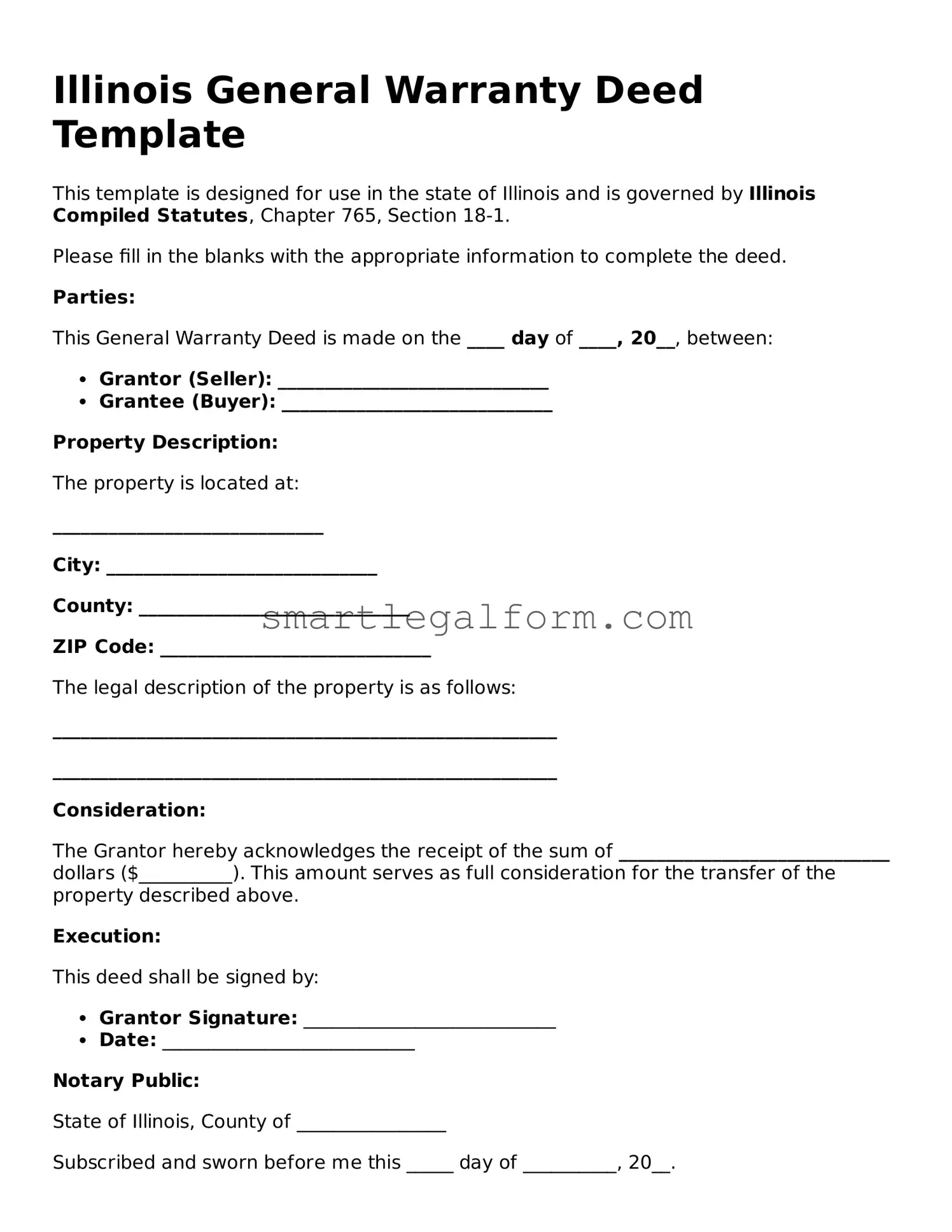Printable Illinois Deed Document
Form Preview Example
Illinois General Warranty Deed Template
This template is designed for use in the state of Illinois and is governed by Illinois Compiled Statutes, Chapter 765, Section 18-1.
Please fill in the blanks with the appropriate information to complete the deed.
Parties:
This General Warranty Deed is made on the ____ day of ____, 20__, between:
- Grantor (Seller): _____________________________
- Grantee (Buyer): _____________________________
Property Description:
The property is located at:
_____________________________
City: _____________________________
County: _____________________________
ZIP Code: _____________________________
The legal description of the property is as follows:
______________________________________________________
______________________________________________________
Consideration:
The Grantor hereby acknowledges the receipt of the sum of _____________________________ dollars ($__________). This amount serves as full consideration for the transfer of the property described above.
Execution:
This deed shall be signed by:
- Grantor Signature: ___________________________
- Date: ___________________________
Notary Public:
State of Illinois, County of ________________
Subscribed and sworn before me this _____ day of __________, 20__.
Notary Signature: ___________________________
My commission expires: _________________________
Witnesses:
- 1st Witness Signature: ___________________________
- 2nd Witness Signature: ___________________________
This deed should be recorded in the office of the County Recorder of Deeds in the county where the property is located.
Common mistakes
When filling out the Illinois Deed form, one common mistake is not providing accurate property descriptions. The description must clearly identify the property being transferred. If it is vague or incorrect, it can lead to legal issues later on. Always ensure that the legal description matches the information found in public records.
Another frequent error involves failing to sign the deed. All parties involved in the transaction must sign the document. Without the necessary signatures, the deed is not valid. It is important to check that all required signatures are present before submitting the form.
People often overlook the need for notarization. In Illinois, a deed must be notarized to be considered legally binding. If the document is not notarized, it may not be accepted by the county recorder's office. Make sure to have the deed notarized before filing.
Finally, many individuals neglect to include the appropriate tax information. Illinois requires that certain taxes be paid when transferring property. Failure to include this information can delay the process or lead to additional penalties. It is essential to verify that all tax requirements are met and documented correctly.
Dos and Don'ts
When filling out the Illinois Deed form, there are several important things to keep in mind. Here’s a list of what to do and what to avoid:
- Do ensure that all information is accurate and complete.
- Do use clear and legible handwriting or type the information.
- Do include the legal description of the property.
- Do sign the form in the presence of a notary public.
- Don't leave any required fields blank.
- Don't use abbreviations that may confuse the reader.
- Don't forget to check local recording requirements.
By following these guidelines, you can help ensure that your Illinois Deed form is completed correctly and efficiently.
Other Deed State Forms
Pennsylvania Deed Form - Reviewing a deed with legal assistance can shed light on potential issues that might arise post-transfer.
How to Get a Copy of My House Deed - Supports transparency in property dealings among parties involved.
New York Warranty Deed Form - Often linked to mortgage agreements or loan closures.
For those looking to understand the process of real estate transactions, exploring the nuances of a properly executed Arizona Deed form is crucial. This document not only facilitates ownership transfer but also ensures that all legal requirements are met for a successful transaction.
Broward County Real Estate Records - Recorded in county land records for public access.
Similar forms
The Deed form serves a specific purpose in legal transactions, particularly in the transfer of property. However, there are several other documents that share similarities with the Deed form. Below are four such documents, each explained in detail:
- Title Transfer Document: This document is also used to transfer ownership of property from one party to another. Like a Deed, it legally establishes the new owner's rights and may require signatures from both parties to be valid.
- Bill of Sale: A Bill of Sale is similar in that it conveys ownership of personal property. While a Deed typically pertains to real estate, a Bill of Sale is often used for items like vehicles or equipment, serving as proof of the transaction.
- Lease Agreement: This document outlines the terms under which one party can use another party’s property. While it does not transfer ownership like a Deed, it establishes rights and responsibilities, similar to how a Deed defines ownership rights.
Hold Harmless Agreement: This agreement is crucial in mitigating risk, ensuring that one party is protected from legal responsibilities that may arise due to incidents or accidents. For more information, you can visit TopTemplates.info.
- Trust Agreement: A Trust Agreement creates a legal entity that holds property for the benefit of another party. Like a Deed, it involves the transfer of property, but it also includes terms regarding how the property is managed and distributed.
Understanding these documents can help clarify the legal landscape surrounding property transactions. Each serves its unique purpose while sharing common features with the Deed form.
